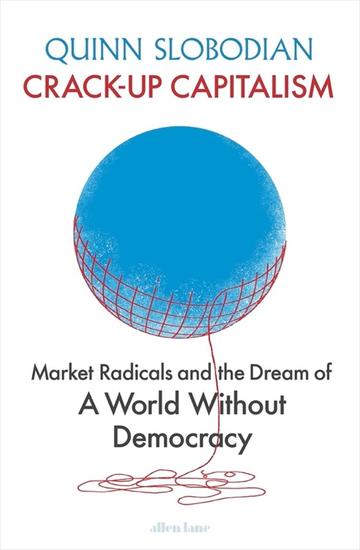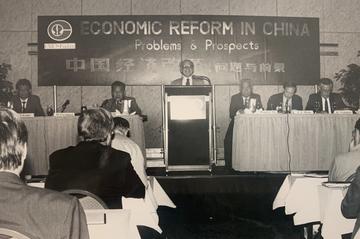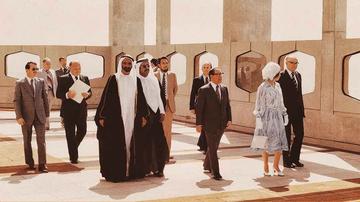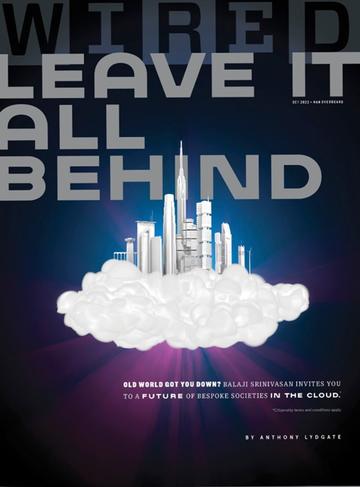A conversation with Quinn Slobodian | Crack-Up Capitalism (Penguin, 2023)

A conversation with Quinn Slobodian, discussing his new book, Crack-Up Capitalism (Penguin, 2023). Slobodian is Marion Butler McLean Professor of the History of Ideas at Wellesley College and is best known his work on the intellectual history of neoliberalism (Globalists, 2018). Focused particularly on the 1990s, Crack-Up Capitalism follows the proliferation of “zones,” new legal entities encompassing tax havens, free ports, city-states, gated communities, and special economic regions. Ranging from Hong Kong and Honduras to California and Canary Wharf, the book shows how the zone was celebrated, and often enacted, by a host of ultra-capitalists, libertarians, and neoliberals who believed it was possible to escape the bonds of democratic oversight and control.
By Dan McAteer, DPhil in Modern Intellectual History at Wadham College, Oxford.
Dan McAteer: So, could you give a summary of the main points that you wanted to get across in the book? What is crack-up capitalism? What is the zone? You write that there are now 5,400 zones globally, which seems hugely significant.
Quinn Slobodian: The intention of the book was to get away from the boring and repetitive binary of globalisation vs. nationalism as the two relevant scales for organising politics and economic life. Especially since 2016, there has been a real emphasis on this idea of a nationalist backlash against “globalists” and “globalism.” And it seemed to me that as an empirical matter, capitalism works at many other scales other than just the global or just the national. In fact, underneath the surface or envelope of nations, you have a whole range of legal jurisdictions that make things more hospitable to certain kinds of economic activity: financial command and control centres, manufacturing centres, centres for research and service provision, and so on. There’s a huge literature on this, especially in geography, anthropology, architectural theory, sociology, but a lot of it is sort of trapped in academic journals. It's often written in specific jargon and it can be hard for outsiders to feel like they can penetrate it. So part of my intention with the book was to just translate a lot of this discussion of sub-national economic geographies out of the academic jargon and into a more accessible form.

But then, at the same time, I carry out a kind of intellectual history of the hardcore libertarians who saw this proliferation of different sorts of legal geographies with delight. These libertarians were inspired to think about how they could pioneer a new form of social organisation that would do away with democratic representation altogether. A kind of possible world governed only by a kind of contract and modified exchange, leaving behind the kind of tattered legacy of attempts at popular sovereignty, or representative government. So, the book works in those two registers, like a field guide to the creation of these unusual legal spaces. The zones are the kind of circuitry of global capitalism; and then there are those people observing that and drawing inspiration for their own projects.
“Zone” is a useful umbrella category, because that is the term used for a lot of these entities. The most well-known ones are probably Export Processing Zones, which began in Ireland around Shannon airport and the 1950s, and Puerto Rico and Taiwan in the 1960s, as places to attract in investors in search of lightly regulated low wage sites for producing goods that can be then plugged back into a globalising supply chain. But the place where the zone really hit its stride was in China during the period of liberalisation in the late 1970s and 80s, when Special Economic Zones became the policy instrument by which China gradually opened itself up to the world market and to foreign investors, by basically saying we'll ring-fence this territory and within it, you can do things you can't do beyond this territory. So, you can re-commodify land, you can re-commodify labour, you can hire and fire in ways that weren't possible in other parts of China, you can have foreign ownership, you can have foreign investment, you can take money out of the country. There really was a kind of free-for-all atmosphere created in places like Shenzhen, that became the locomotive of Chinese export growth in the 80s and much more so the 90s.

Milton Friedman gives a speech at a Cato Institute event in China, 1988. Hoover Institution, Milton Friedman Papers, 114.14
That galaxy of zones which emerges in China becomes very important as a source of inspiration for people elsewhere. The zone is this sub-national legal category, designed as a form of economic incentivisation which then also ends up fertilising some more far-reaching, radical political imagination.
DM: In the historiography of neoliberalism, one of the best-known texts remains the Marxist sociologist David Harvey's A Brief History (2005). His choice to include Deng Xiaoping under the neoliberal umbrella is controversial, especially among intellectual historians, including yourself. But Harvey’s coming at neoliberalism from the perspective of it being a capitalist political project designed to discipline labour, rather than just an intellectual movement. It seems that what you've done in this book is found some kind of middle ground, because you're saying the zone is fundamental to the way in which capitalism has changed since the 70s and 80s, and that many signal figures in the neoliberal thought collective were cheerleading the zone as it proliferated. Does this mean your thinking on neoliberalism has shifted since Globalists (2018), especially in the context of tackling the zone?
QS: No that's a good point, I hadn't thought about it that way. But then on the other hand, part of the incentive for this book was to get away from what had become a little bit of a boring sequence in the neoliberal historiography, which went along the lines of: first, it was tried out in Chile under Pinochet, then it was really rolled out under Thatcher in the UK, and Reagan in the United States. As a narrative, that historiographical model said: here are these large national states that get a new, right-leaning government. This new government has policy advisors whispering in their ear, giving them ideas for how to privatise, deregulate, and liberalise. And then that model was extended overseas, through international financial institutions, etcetera.
The notion that this remained the ideal type for neoliberalism today, in 2023, seemed to me to be missing a lot in between. And it also misses a lot of the novelties of capitalist transformation in the last 40 years, which are not comprehensible within the histories of nation-states alone.
For decades now, the anthropologist Aihwa Ong and others have been saying that if you want to understand neoliberalism you need to look at East Asia and Southern China in particular. Now, the interesting thing about it is that it’s not case that Deng Xiaoping had Hayekian advisors which somehow turned him into a neoliberal. He did not introduce the Special Economic Zones – and nor did the people who followed him – with the intention of abdicating central control or granting entrepreneurs true, unlimited licence to transform the country as a whole. The whole point was to keep business energies in harness, subordinated in a way to central power; to only give them so much leash.
So, if you think of neoliberalism less as an ideational project, as just the realisation of the blueprints of a small set of intellectuals and, instead, you think of it more as a kind of contrapuntal thing, it makes more sense. What I mean in terms of counterpoint is that there were actual practitioners of capitalism out there seeking profit, whether they're Euro dollar bankers or offshore tax haven consultants. Neoliberal intellectuals were watching this, drawing insight from the actions of these practitioners and then operationalising those into policy prescriptions. So, there's a feedback loop between the practice of capitalism out there and the way it gets filtered through these groups of thinkers to further accelerate the very trends that they're observing.
The reason I would still feel uncomfortable with including Deng Xiaoping in the pantheon of neoliberal state leaders is that the valence of the zone remains disputed. I get to this in the conclusion of the book. Even among libertarians, you have tension between those who believe the Special Economic Zone to be a sphere of freedom, even if they’re enmeshed within larger authoritarian states. And then other libertarians who say that they’re quite the opposite: that the places which have used zones most effectively are completely authoritarian capitalist models, from Dubai to China. That zones are really the instruments of states, rather than instruments against states. And I think the latter argument is probably closer to the truth.

Chinese poster, December 1992. BG E15/292, Landsberger Collection
So, part of the storyline in my book is therefore the ways these intellectuals and policy people tried to figure out how they can use the zone. To finally unleash it from the state power that has in fact tended to keep zones fairly controlled. It would be a misreading of the book to think that I'm saying that these zones have genuinely undermined state sovereignty globally; that I’m saying that “power,” quote unquote, really lies in the “world economy,” as some of the headlines and reviews about this book have unfortunately said. I actually don't think that's true. I think that for the most part, these zones are used quite candidly by political leaders to create areas of unaccountability or to accelerate economic activity for their own interests.
DM: Empire, especially the ghost of the British Empire, features very heavily in the book. You look at the 19th-century scramble for concession ports in China, at Apartheid Bantustan, at Harold Wilson's withdrawal east of Suez in 1968 and the role that played in driving a more muscular Dubai. How should contemporary intellectual historians engage with these kinds of longer-term structural factors?
QS: Just as much as the geographers and anthropologists, I'm inspired by historians of empire, especially the older historians of empire, like Lauren Benton, for example, who showed in their work that we'd be wrong to think of empire as something producing civilizational homogeneity. Or that because you've now painted swaths of the map red, now this part of the British Empire becomes like that other part. Economically and legally, empires were ‘lumpy,’ as Benton famously puts it. They were composed of a bewildering variety of jurisdictions, just like zones are today, from protectorates to treaty ports to concessions and so on. And they were heterogeneous, because difference was useful for enterprising agents of empire in their own processes of capital accumulation. And that was done until the late 19th century, largely through kinds of outsourced private actors, whether it was the East India Company or someone else. So I think that imperial economic strategy has always walked the line between private actors playing the empire for their own advantage and the Empire utilising private actors for its own enrichment and expansion. And it was never settled, it was very disputed. The Indian Mutiny ends up calling the rule of the East India Company into question, in a way that leads to the absorption of India into the Raj, into the formal Empire, which is the end of the argument in some ways.
The path dependency created by the British Empire in the global economy is remarkable. It produced grooves in the world system that there then re-travelled by other actors. You have the British Empire creating a series of coaling stations and free ports and harbours through the Suez Canal and into Southeast Asia. And then those same sites become places that, in recent years, someone like Dubai or Singapore then build their own string of ports and harbours in. The Chinese Belt and Road Initiative has itself followed that exact same chain of footholds and footprints and enclaves along the coast of the Indian Ocean. So, Empire never goes away. It just transforms.
In terms of contemporary intellectual history, it’s an interesting time to be practicing it. I feel like it’s having a resurgence in the sense that people are, especially broader audiences, more interested in the “power of ideas,” as it were. But the better intellectual history, in the Cambridge School tradition, is not interested in ideas as actors in and of themselves, as operating in vacuums. Which means that to do good intellectual history, you end up having to be a historian of all kinds of other social movements, of economic patterns, and so on.
So, although I’m paying attention to materialist transformations and then the way those transformations are both observed and influenced by thinkers, it’s still intellectual history in a post “history of ideas” mode. These libertarians aren't just observers in an ivory tower sense, they're people who are trying to intervene in the course of history.

Queen Elizabeth II formally opening the Dubai World Trade Centre in 1979. Credit: John R Harris Library
DM: Although so-called “paleolibertarians” like Murray Rothbard feature in the book, many of the libertarian actors you look at are enamoured with sci-fi, futurism, and so on – they seem almost accelerationist, perhaps. How would you characterise the suite of libertarian groups you looked at?
QS: I homed in on the anarcho-capitalist label, which is probably the most helpful category in the sense that these people would use it to describe themselves and other people outside know what it means. I was also aware that, for some reason, radical libertarians and anarcho-capitalists had fallen out in the recent wave of histories of neoliberalism that we’ve seen over the past decade or two.
I mean, my own last book made the same gesture that many other people had done before me. Which is to say: to think that there is no state in neoliberal thought is wrong. In fact, it's a refashioned state or repurposed state. And that is certainly true for Milton Friedman and Friedrich Hayek and James Buchanan and down the list, but, in fact, there is a group of more extreme members of the neoliberal movement, who do indeed believe in doing away with the state altogether. So, part of my attraction to this current book was that lacuna in the scholarship. And then it's also fun to contradict yourself. Everyone has that feeling where you say something, and you know that there's an Achilles heel in your argument, but no one picks it up.
DM: You use three different terms in the book: market radical, libertarian, and neoliberal. Delineating between these things is difficult. In the book, you say that libertarians are an important part of neoliberalism and the neoliberal thought collective. But how should we distinguish between libertarianism and neoliberalism?
QS: Good question. It's a perennial, labelling question, right? I find the provisional label of neoliberal to describe the people who collect in the Mont Pelerin Society, for lack of a better way of describing the container. And within that there is this diversity, like the Austrian School, Virginia School, Chicago School, and so on. And then a couple of more out-there libertarian thinkers like Murray Rothbard, often deriving their thought from natural law. And they disagree fiercely with one another.
Does it make sense to talk about Rothbard as a neoliberal just because he had a Mont Pelerin membership, when he himself is very hostile to the neoliberalism of someone like James Buchanan? Well, that's where it gets tricky. I tend to find calling Rothbard a neoliberal to be a bridge too far.
So why do I default to libertarianism as a label? I think it's easiest as a term that works both inside their own world and outside their world. And I think that the neoliberal category, for me, best captures the idea in its original 1930s formulation, in terms of the need to rethink classical liberalism and repurpose the state to better protect the market. If you are thinking about doing away with the state altogether, then you aren't really doing that. You are foregrounding economic freedom first and saying if we want economic freedom, and we want to do it with the state, how do we proceed? That’s a different design challenge to wanting to repurpose the state to better protect economic freedom. And it leads you in interesting directions, as I think I hope I've shown in the book, because if you say we don't want to have a state, then you've suddenly made the design problem much more difficult for yourself. You need to think of alternative mechanisms and institutions to replace state power.
That’s where things come in that I didn’t get to talk that much about in the book, things like racial and ethnic homogeneity. It’s an important theme in Rothbard, in Gordon Tullock talking about gated communities, which tend to be ethnically homogeneous.
And in Leon Louw and Frances Kendall’s proposal to cantonise South Africa, allowing different racial communities to exist separately. It’s a recurrent theme. Not just because they're racists in the abstract, and they may or may not be, but because they have an intellectual argument for homogeneity’s importance within these gated communities. They say that if you have the same ethnicity as someone you trust them more, and that decreases transaction costs. And that’s one of their solutions to abolishing the state, it’s that you turn to other bonds which substitute for what citizenship once was.
DM: Aside from the British Empire, another entity looming heavily over the whole book is California, especially California as an Asia-facing geography. At one point, you underline San Francisco as an epicentre of neoliberalism and libertarianism, pointing out that the Cato Institute was at the foot of the hill where Milton Friedman and Anthony Fisher were living in the same apartment block. There’s also a lot of Silicon Valley in the book. Do intellectual historians of market ideas need to pay more attention to California?
QS: To some extent they already are. I think the attention to like Malcolm Harris's new book, Palo Alto, has been very good, for example. He gives a materialist underpinning to this “Californian ideology,” as it's known, to show that this is actually part of a centuries-old history that begins with settler colonialism and the idea of the frontier as a space to be enclosed into private property.
With my book, I particularly wanted to revisit the history of the nineties. We have an overly simplistic idea of that decade, that it was the end of history, Kumbaya to globalisation, and Coca Cola. This notion is belied when you look at the culture of the period. There was an extraordinary efflorescence of cyberpunk-style literature that imagined a fractured world. People are talking about the breakup of states and undermining of sovereignty by new transnational actors. Somalia is a stateless nation for a decade.
This is all tightly interwoven with crack-up capitalism. Milton Friedman’s son, David Friedman, is particularly known for his anarcho-capitalist book The Machinery of Freedom. In the 1989 edition, he gives a list of recommended reading, one of which is the sci-fi novel Oath of Fealty (1981), by Jerry Pournelle and Larry Niven. Oath of Fealty imagines a world of gated communities, completely privatised services, and interestingly, a world of conformity: these private communities impose a lot of rules on their members, governed by private contract. In Snow Crash (1992), which gave us the idea of the Metaverse, it’s similar: a world of zones. So I knew that I wanted to flip that nineties story and explain that we didn’t realise that capitalism had the capacity to break-up societies with Trump in 2016. It’s been something on people's minds for some time.

Oath of Fealty (1981) and Snow Crash (1992).
DM: We should point out how influential cyberpunk and sci-fi was in the 90s and 2000s tech world. The Cryptonomicon was required reading at Elon Musk and Peter Thiel’s PayPal, Mark Zuckerberg put libertarian Peter Huber’s Orwell’s Revenge on his recommended reading list, even Bill Gates says he was inspired by the Robert Heinlein’s libertarian classic, The Moon is a Harsh Mistress.
QS: Yes, and in the course of writing Crack-Up Capitalism, I was struck by the speed with which Silicon Valley has fallen from grace. In 2010, 2011, 2012, there was so much confidence that Silicon Valley would be the site of delivery of the country and the world from all of its problems through these magical gizmos and gadgets that they're creating. And that narrative was being encouraged by the most prominent heads of state. Silicon Valley fantasies went all the way to thinking that they had now superseded the old “Paper Belt” of Washington DC, Boston, New York City and so on.
But one thing I realised was that this tech optimism was actually all about the Iraq War, too, in a way that I hadn't taken on board. In other words, if we think about it through the lens of imperial history, the Iraq War played the role that like Belgian colonialism played to British imperialism. It was the “bad” empire, the disastrous case against which Silicon Valley could say: no, we can do this better. We’re going to go off and rethink colonialism, rethink transformation of territorial rule, and it won't be as bad as what they're doing over there in in Iraq.
This led to the economist Paul Romer proposing the idea of a “charter city” in 2009. He is explicit in saying that the charter city is not going to be Iraq, it’s something better. We're going to take Guantanamo Bay and turn it into a new Hong Kong.
DM: Right, but your book also deals with tech libertarianism before Iraq. You write about John Perry Barlow’s Declaration of the Independence of Cyberspace (1996) and James Davidson and William Rees-Mogg’s The Sovereign Individual (1997). What's your take on that longer history of libertarianism in the tech world?
QS: Balaji Srinivasan, the focus of the Metaverse chapter, has pretty cogently explained this ideology more than anyone else, perhaps. The way he puts it, which is succinct and accurate, is that these people imagine the virtual world to be an extension of the settlement of the frontier. As a child of immigrants and embodiment of the American Dream, he has this rather diluted version of American history, which was that if you wanted to try your luck, you could simply go west and get land. You could struggle, and maybe succeed. For him, what the Internet did was it just produced a frontier beyond the West Coast. That we went so far into the west that we went up and into the Cloud, which is the way he puts it.

October 2022 Wired frontcover covering Balaji Srinavasan’s cloud ideas
DM: ‘Homesteading on the Electronic Frontier’ as they put it in the 90s.
QS: There you go. Right, exactly. So I think that the frontier image is probably the correct story. And there are easy ways to criticise that, but I guess what I was trying to do with the discussion of the Silicon Valley ideology was to say something a little bit more than the immediately obvious. I'm still not sure how one does that. Because it's become almost like a prayer we all enjoy on the left, to just bemoan the naivety of the tech people in their visions, and to point to all the ways all the things that they're repressing and leaving out and their blind spots and so on. I'm curious to see how we can kind of go further than that.
One way forward might be to recover forgotten lineages of engagement with software and technology that could become resources to draw upon in the present. My book is about anarcho-capitalists, but people have pushed me on this, and asked about traditions of left anarchism. And you know, I've joked now more than once about needing to write “Crack-up Commoning” as a reply to Crack-up Capitalism.
Is it the case that every movement towards decentralisation needs to be moving in the direction of further privatisation and further contractualisation? I don't think it does, actually. And I think there's just as interesting and probably politically more important to the story to be told about all the ways that these things can at least theoretically be moving towards de-commodification and de-contractualisation. In Western Canada, for example, where I spent lockdown, I saw that Facebook Marketplace came alive not with people trying to sell things, but with offers of help and a sharing economy. Mutual aid still exists, and it can be a powerful force.
So, although the book is pessimistic in that it follows the storylines of people who seek to secede and profit from the pressures of the present, it would be nice, and I would like to read and maybe even write, the alternative or complementary storylines.
DM: However, a point you make in Crack-up Capitalism is that the libertarian zone ultimately goes running with its begging bowl to state power when in crisis. You write about the 1996 IRA bomb at the Canary wharf zone, for example, leading to a ‘mini ring of steel,’ and suggest that the ultimate landing pad for tech libertarianism would probably resemble Israel: technophilic, highly militarised, besieged, and paranoid. Could you say a bit more, then, about the telos of the zone in relation to the state? Does Leviathan inevitably return? And do you envision the same telos applying to these left libertarian or anarchist alternatives?
QS: Well, the best example is the creation of this liberated zone in Honduras, called Prospera ZEDE (Zone for Employment and Economic Development). Plans were only laid in 2011 and it was modelled on the charter city. It tried to be even more radical, like a private territory that can form legal arrangements and have its own court system. It was like something very close to the anarcho-capitalist fantasy.
And yet, when an election goes the wrong way for them and the new president tries to shut it down in 2022, the radical libertarians were immediately filing a huge legal case under the Central American Free Trade Organisation. And as one of the investors says, it turns out that international law can be really useful for libertarians once in a while. So the dynamic is exactly that, escape from the state until the boot pinches, and then search around for any kind of state power that is available, a bit like the venture capitalists at Silicon Valley Bank.
In terms of the alternatives to capitalist libertarianism, I suppose there are two ways to jump. One is to uncover these complementary left libertarian or left anarchist zone experiments and hope that they have some other kind of outcome rather than those of the anarcho-capitalist right wingers.
The other is to just recover the state. And I think the latter is my more, perhaps politically boring, but more trustworthy instinct. The state actually hasn't gone anywhere, and it still has power. And these zones are really just places where the state has allowed some its authority to recede for reasons of its own self-interest.
Instead of states being subordinate to capital, why don’t we say that capital should be subordinate to states? And there are trends towards that. Even five years ago, nobody thought there would be something like a global minimum corporate income tax being accepted by the OECD. The way the offshore world is being disciplined is an important move towards a revival of a kind of fiscal sovereignty which is necessary for a renewed social democracy. Maybe left zones can be part of the solution. But my instinct would be to say that rather than needing to counter “their” zone with “our” zone, so to speak, the old-fashioned democratic nation state probably still has some juice left in it.


